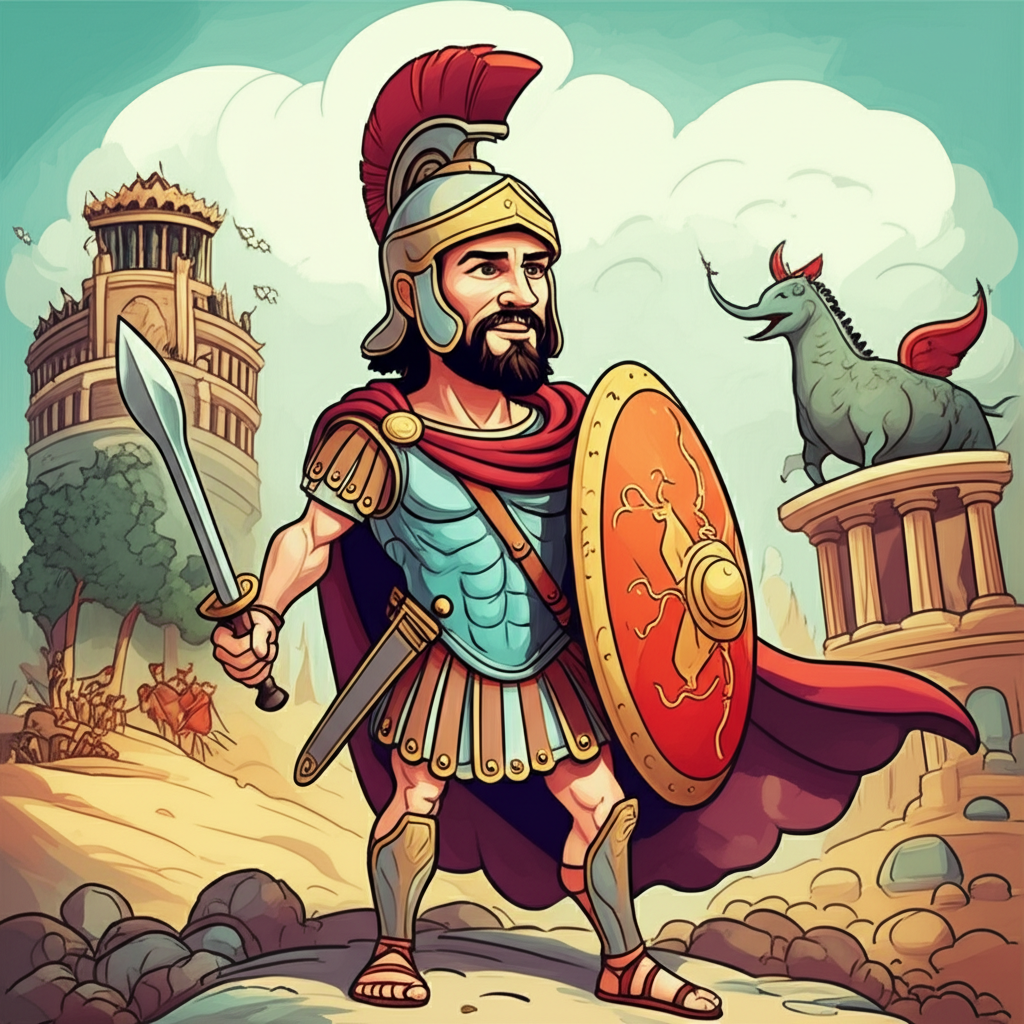
The dust of ages settles thick upon the ancient world, and within that haze of time, stories bloom. One such enduring narrative, woven from the threads of myth and legend, hails from the vibrant tapestry of Greco-Roman culture. This is the saga of Aeneas, a Trojan hero whose arduous journey, as chronicled by poets like Virgil in his epic Aeneid, became foundational to the story of Rome. It’s important to understand that this is a traditional tale, a product of ancient imagination, not a historical account to be taken as literal truth.
The era in which these myths flourished was one where the boundaries between the divine and the mortal were fluid. Ancient peoples, facing a world filled with both wonder and peril, sought explanations for the natural phenomena around them, the origins of their societies, and the very fabric of existence. Their worldview was often imbued with a sense of the sacred in the everyday, where gods and goddesses actively intervened in human affairs, and where heroic deeds held profound significance for the collective destiny of a people. The Mediterranean, a crossroads of civilizations, was a fertile ground for the exchange of stories, and the fall of Troy, a celebrated event in Greek mythology, provided a powerful catalyst for new narratives.
At the heart of this myth stands Aeneas, a figure depicted as a demigod, son of the mortal Anchises and the goddess Aphrodite (Venus in Roman lore). He is not a god himself, but one touched by the divine, granting him a certain resilience and destiny. Symbolically, Aeneas represents the enduring spirit, the capacity for survival against overwhelming odds. His lineage, connecting him to the very gods, imbues him with a sense of inherent nobility and a divine mandate. He is often portrayed carrying his elderly father from the burning city of Troy, a powerful image of filial piety and responsibility, and leading a band of his people, symbolizing leadership and the preservation of a legacy. His journey is fraught with trials, reflecting the arduous path of any great undertaking and the sacrifices required for a new beginning.
The narrative of Aeneas’s quest begins amidst the smoldering ruins of Troy. After the city’s catastrophic fall to the Achaeans, Aeneas, guided by the gods and driven by the desperate need to preserve his people and fulfill a prophecy, gathers the surviving Trojans. His mission, whispered by the shades of the dead and divinely ordained, is to leave the ashes of his homeland and seek a new destiny across the vast and unforgiving sea. This is not a quest for personal glory, but a sacred undertaking, a transplantation of a culture and its gods to a new land.
His journey is a relentless odyssey. He sails the Mediterranean, encountering treacherous storms, divine wrath, and alluring temptations. He lands on the shores of North Africa, where he experiences a passionate but ultimately doomed love affair with Queen Dido of Carthage. This episode, a poignant exploration of love, duty, and betrayal, highlights the internal conflicts Aeneas faces as he grapples with his destiny. Forced by divine decree to leave Dido and her burgeoning city, he continues his voyage, eventually reaching the shores of Italy, the land foretold.
Upon arrival, Aeneas faces further challenges. He must navigate the complex political landscape of the native peoples, including the fierce Rutulians led by the proud Turnus, and secure his place. This involves forging alliances, engaging in fierce battles, and ultimately fulfilling his fated role as the founder of a new civilization. The climax often involves a climactic duel with Turnus, a struggle that symbolizes the clash of old and new, the establishment of order over chaos. Through these trials, Aeneas, with divine assistance and his own unwavering resolve, lays the groundwork for what will become Rome.
To the ancient Romans, this myth served multiple profound purposes. It provided a glorious origin story, tracing their lineage back to the legendary heroes of Troy and linking them to the divine realm. It offered a narrative of divine favor, suggesting that Rome’s eventual dominance was not merely the result of conquest, but of a destiny preordained by the gods. The story of Aeneas embodied key Roman virtues: piety (devotion to gods, family, and state), duty, perseverance, and leadership. His sacrifice of personal happiness for the greater good of his people resonated with the Roman ideal of civic responsibility. Furthermore, the myth helped legitimize Roman claims to territory and authority in Italy, portraying them as inheritors of a divinely sanctioned legacy.
In the modern world, the tale of Aeneas continues to echo through various cultural expressions. His story is a cornerstone of classical literature, studied and appreciated for its literary merit and its enduring themes. In film and television, adaptations and references to the Trojan War and its aftermath often touch upon the broader epic of Aeneas. Video games have explored his journey in interactive formats, allowing players to engage with the mythology. In academic fields like classical studies and comparative mythology, the Aeneid and the legend of Aeneas are vital for understanding ancient Roman identity, their relationship with Greek culture, and the power of foundational myths.
In closing, it is crucial to reiterate that the saga of Aeneas is a magnificent cultural narrative, a testament to the power of human imagination and the enduring desire to understand our origins and purpose. It is a story passed down through generations, shaping the cultural landscape of the West. As Muslims, we recognize that only Allah, the Almighty, is the true Creator and Sustainer of all existence. We view such ancient tales as valuable insights into the cultural heritage and storytelling traditions of humankind, offering a window into the beliefs and aspirations of people long past, without any claim to divine truth. The echoes of Troy, carried by Aeneas, serve as a reminder of the rich tapestry of human history and the timeless art of storytelling.


